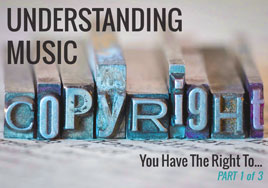
Understanding Music Copyright—
You Have the Right To…
By
Estimated reading time: 6 minutes
written by: David Frazee
“I wish I had known that education is the key. That knowledge is power.”
—Mary J. Blige,
interview with Oprah Winfrey, 2006
As an independent musician, the more knowledge you have about the music industry, the better off you are. This means you need to learn about the industry, including your rights as a songwriter and performer. Not taking the time to learn about legal matters might seem easier up front, but in the long run, learning a few basic principles about your rights can be extremely empowering.
If you haven’t taken the time to learn about your rights, you’re in luck, because I’m going to cover them here. Even if you are familiar with your rights, brushing up on something this important is never a bad idea.
I know things can get complicated quickly when it comes to legal issues, so I’m going to break them down for you and explain some basics you should know.
What Can You Protect?
In the music industry, there are two main protectable elements: musical composition and sound recordings. The law intentionally protects these elements separately, and I’ll explain why in a little bit.
Musical composition refers to the underlying music (and lyrics, if applicable). They arise whenever someone wants to use your music or lyrics. This includes sampling, covering, performing your songs live, and even streaming your music online. Most importantly though, this is the part of your rights that publishing companies find valuable.
As a songwriter, you are thinking of music and lyrics all the time. So, at what point do you have musical composition rights? Say John sits down one day and finally writes sheet music for the music and lyrics he has been working on all week. A day or two later, he decides to record his song and saves it as an MP3. A week later, he decides he to play the song at his next gig. Under the law, musical composition rights arise automatically at the moment you “create” the music. But, there’s a caveat. There needs to be an element of “permanence” to the creation for the rights to arise. It does not require publication or an actual recording on a CD. In our example, John couldn’t just keep the music and lyrics in his head. He had to write them down on something intending it to be permanent. In this case, his musical composition rights would have been formed when he wrote the sheet music.
Sound recording rights only arise from the actual placing of the musical composition and lyrics on a record, CD, MP3, or other object. Sound recording rights come into play whenever someone wants to copy, distribute, or use a previously recorded version of your song. This can include demo recordings or anytime you have placed your music (or someone else’s composition that you have obtained the rights to) on any medium (CD, MP3, etc.) by any method, regardless of whether or not you release the song to the public.
What do you have to do to get this right? Like musical composition rights, sound recording rights arise automatically when you record your music. Take John in the previous example. Until he recorded his song and saved it, he did not possess any sound recording rights. However, he did not have to play the song in public for that right to arise. For sound recording rights, it is not the song but the sounds recorded on the medium of the author’s choice that are protected.
You don’t have to file any paperwork with the copyright office to get musical composition or sound recording rights. Additionally, copyright fees can quickly add up if you file every time you have a song idea. Many independent artists look for ways to minimize this cost. If you’ve done some research on filing, maybe you’ve heard of an alternative called the “poor man’s copyright.” Here is how it works: in a sealed envelope, send yourself a CD (tape, etc) of the recorded music (and the copy of the sheet music) in the mail. Once it arrives, you DO NOT open it. Some states may recognize this as proof that you own the copyright on the date stamped by the post office.
So, if you don’t have to file, why file at all? To better protect your work.
Let’s say someone uses your music without your permission, and you want to stop him or her or recover revenue from his or her use. To do so, you’ll probably have to take the matter to court. Here’s where filing with the copyright office makes a difference. First, you can only file a civil lawsuit in federal court if you have filed with the copyright office. Second, in an infringement lawsuit, you have to prove you own the rights to the songs and that the other person had access to your music to copy it. Third, it is unclear if the poor man’s copyright will stand up in the federal courts.
While I understand the desire to wait or save some money, filing with the copyright office prior to getting involved in a legal dispute makes it easier and less costly to defend your rights.
What Protections Do You Have?
The US Copyright Act provides creators—which includes songwriters—with six exclusive rights. They are:














Comments